Over 30 years of anarchist writing from Ireland listed under hundreds of topics
Analysis
Capitalist Globalisation and Imperialism
The Workers Solidarity Movement position paper on Capitalist Globalisation and Imperialism, as ammended at July 2004 National Conference. This sits under the State and Democracy position paper.
The partition of Ireland
WSM position paper on the partition of Ireland. Last debated and updated at the April 2009 conference. It sits under the State and Democracy position paper.
The Partition of Ireland
A Workers Solidarity Movement Position Paper
1916 - Connolly, blood sacrifice and defeating British imperialism
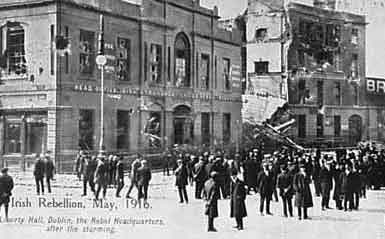 At 11.30 in the morning of April 24 1916 Bugler William Oman, a member of a syndicalist workers militia the Irish Citizen Army (ICA), sounded the 'fall-in' outside his union headquarters. This was the start of an insurrection in Dublin which was to see around 1,500 armed men and women seize key buildings throughout the city, and to hold these positions against thousands of British Army soldiers for almost a week. In the course of putting down the insurrection, 1351 people were killed or severely wounded and 179 buildings in the city centre were destroyed.(1)
At 11.30 in the morning of April 24 1916 Bugler William Oman, a member of a syndicalist workers militia the Irish Citizen Army (ICA), sounded the 'fall-in' outside his union headquarters. This was the start of an insurrection in Dublin which was to see around 1,500 armed men and women seize key buildings throughout the city, and to hold these positions against thousands of British Army soldiers for almost a week. In the course of putting down the insurrection, 1351 people were killed or severely wounded and 179 buildings in the city centre were destroyed.(1)
Image: Liberty hall after the rising
1916, left republicanism, anarchism and class struggle
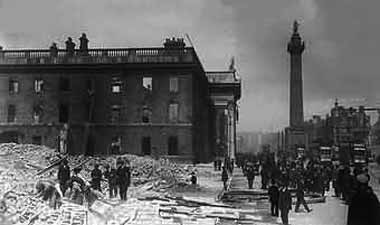 This article is an anarchist analysis of the 1916 insurrection and the war of independence in the context of the struggle for socialism in Ireland and internationally. It concentrates on the 'unknown' but intense class struggle that ran alongside the war of independence and the role republicanism played in the suppression of that struggle. It asks 'what is freedom' and shows how anarchism originated amongst earlier European left republicans as an answer to the limitations of republicanism.
This article is an anarchist analysis of the 1916 insurrection and the war of independence in the context of the struggle for socialism in Ireland and internationally. It concentrates on the 'unknown' but intense class struggle that ran alongside the war of independence and the role republicanism played in the suppression of that struggle. It asks 'what is freedom' and shows how anarchism originated amongst earlier European left republicans as an answer to the limitations of republicanism.
Image: O'Connell street after the insurrection
An anarchist opinion on the Dublin anti-loyalist march riot
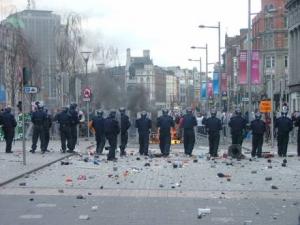 Saturday saw a major riot in Dublin in response to an attempted Loyalist 'Love Ulster' march through the main street of the capital. For three hours hundreds rioted in the city centre, banks and shops were attacked and looted and cars were set on fire. All the political parties including Sinn Fein have condemned the riots but few have analysed what happened. This article first submitted to indymedia.ie suggests the riot shows that "he who sows misery, harvests anger". The author is a WSM member living in Dublin, this is his personal view of events.
Saturday saw a major riot in Dublin in response to an attempted Loyalist 'Love Ulster' march through the main street of the capital. For three hours hundreds rioted in the city centre, banks and shops were attacked and looted and cars were set on fire. All the political parties including Sinn Fein have condemned the riots but few have analysed what happened. This article first submitted to indymedia.ie suggests the riot shows that "he who sows misery, harvests anger". The author is a WSM member living in Dublin, this is his personal view of events.
Environmentalism, Class and Community
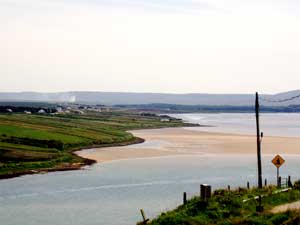 The economic boom in Ireland and the construction boom that has come alongside it has led to a growth in the importance of environmental campaigns. There has frequently been a large gap between the environmentalists involved in such campaigns and the left - including anarchists. Sean, one of the 'Carrickminders' and now a member of the WSM gives his view on what can be learnt from the recent struggles. Capitalism in Ireland is certainly booming. The country in profit based terms has seen unprecedented growth. This growth is illustrated on the great barometer of Capitalism- GDP (Gross domestic product) which has increased each year since 1991.
The economic boom in Ireland and the construction boom that has come alongside it has led to a growth in the importance of environmental campaigns. There has frequently been a large gap between the environmentalists involved in such campaigns and the left - including anarchists. Sean, one of the 'Carrickminders' and now a member of the WSM gives his view on what can be learnt from the recent struggles. Capitalism in Ireland is certainly booming. The country in profit based terms has seen unprecedented growth. This growth is illustrated on the great barometer of Capitalism- GDP (Gross domestic product) which has increased each year since 1991.
Communism: What's In A Word?
This article opens by looking at how the meaning of communism as opposed to socialism evolved in the late nineteenth century and closes with a look at how this applies to the free software movement today. The terms socialism and communism appear in England around the 1820s as terms adopted by members of the cooperative movement who were sick of hearing their politics referred to as "Owenism". Originally the two terms were undifferentiated but by the 1840s communism was used by revolutionaries to differentiate themselves from reformists such as J.S.Mill who had adopted socialism to cover an indigestible mess of reformisms.
Thinking about Anarchism: What is anarchism?
Many people still associate anarchism with violence, destruction, and chaos. This concept of anarchism is reinforced by the corporate media, and those that have an interest in discrediting the anarchist movement. Needless to say this idea of anarchism bears no correlation with the society we are trying to create, or our struggle to achieve it.
The Dublin EU Mayday protests of 2004 - The Ghost of Mayday Past
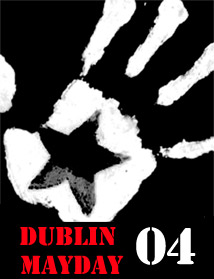
Compared to many other European countries May Day demonstrations have always been small in Ireland, even in the 1980's when the Stalinist left was much more influential and the unions were much more powerful. By the mid-1990's, with the old left in complete disarray and the union bureaucrats more focussed on partnership with the state and the bosses rather than workers' rights, May Day had become a fairly underwhelming event.
So, given this dismal tradition why were the explicitly libertarian May Day events in 2004, comparatively speaking, such a success? Of course there was the impetus of a major European Union summit but to understand why anarchists were in a position to organise big May Day events calls for a brief examination of the development of libertarian ideas and practices in Ireland over the past few years.
The Nomad, the Displaced and the Settler: Work in the 21st century
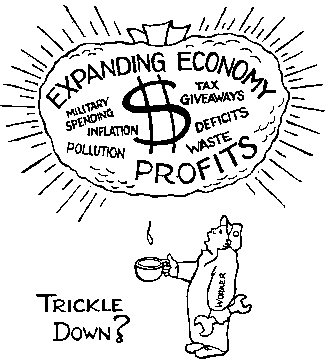 In many countries there has been a debate as to the nature of the changes in western workplaces; in Britain they talk about increased casualisation of the workforce, in the US they talk about contingent labour and on the European continent they use the language of precarity. Central to in all these debates is the issue of job insecurity.
In many countries there has been a debate as to the nature of the changes in western workplaces; in Britain they talk about increased casualisation of the workforce, in the US they talk about contingent labour and on the European continent they use the language of precarity. Central to in all these debates is the issue of job insecurity.
A number of issues are being discussed. Firstly has the workplace changed fundamentally such that people increasingly are in temporary work rather than permanent work? Secondly is the division between work time and non-work time dissolving, are we spending more of our lives 'in work'? Thirdly are the non-work aspects of life becoming increasingly insecure?

